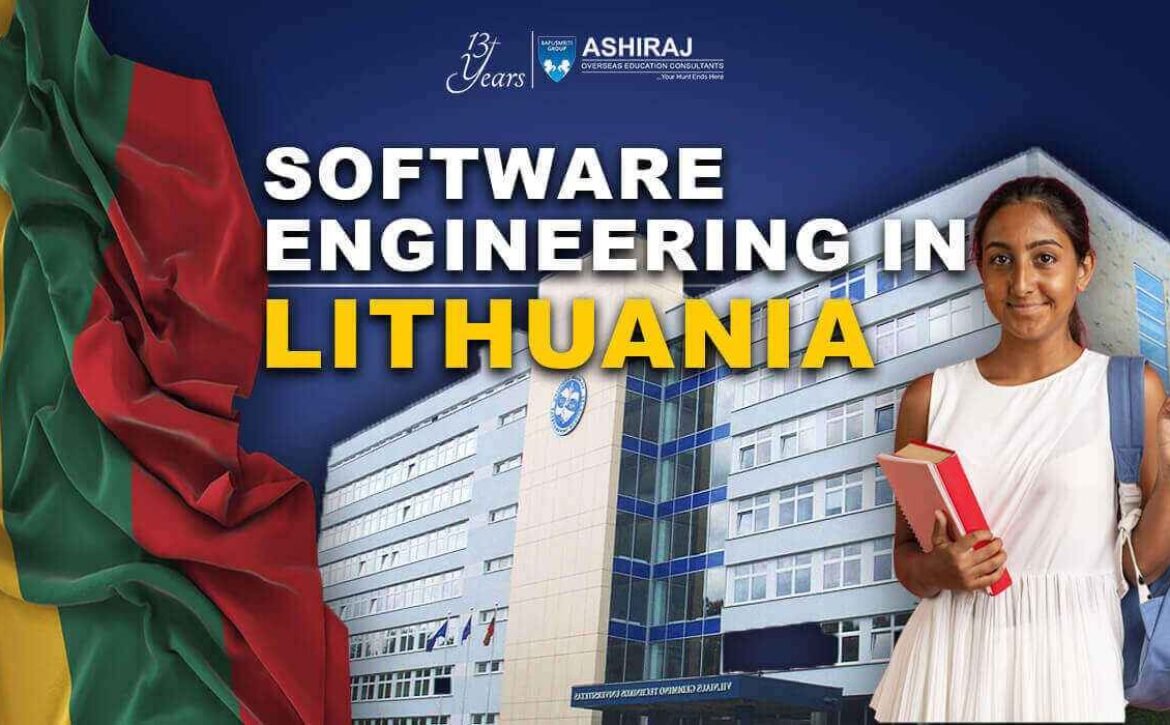
Software Engineering in Lithuania
Lithuania, a Baltic state known for its rich history and picturesque landscapes, has emerged as a burgeoning hub for Software Engineering. The country’s focus on technological innovation, coupled with a robust educational system, has fostered a thriving ecosystem for software development. “Software Engineering in Lithuania” encapsulates a dynamic landscape where skilled professionals and cutting-edge technologies converge.
With a rapidly growing tech sector, Lithuania offers a conducive environment for software engineers to flourish. The country’s strategic location within the European Union provides access to a diverse talent pool and facilitates collaboration across borders. Companies in Lithuania actively engage in various software development domains, including fintech, cybersecurity, and AI-driven solutions, amplifying opportunities for professionals in the field.
Moreover, Lithuania’s supportive infrastructure, government incentives, and a vibrant startup culture further bolster the software engineering scene. As the world increasingly relies on digital solutions, “Software Engineering in Lithuania” stands at the forefront, contributing significantly to global technological advancements.
Why Study Software Engineering Courses in Lithuania?
- Thriving Tech Ecosystem: Lithuania offers a vibrant tech scene, making it an ideal place to study Software Engineering. The country’s growing reputation in the tech industry provides ample opportunities for students.
- Renowned Educational Institutions: Lithuania boasts top-tier universities offering exceptional Software Engineering courses. These institutions prioritize practical knowledge, equipping students with skills highly sought after in the industry.
- Cutting-Edge Curriculum: The Software Engineering courses in Lithuania are designed to cover a wide array of subjects, including programming languages, software development methodologies, and emerging technologies, ensuring a comprehensive learning experience.
- Industry Connections: Students studying Software Engineering in Lithuania benefit from strong ties between educational institutions and tech companies. This facilitates internships, collaborations, and potential job placements, providing valuable real-world exposure.
- Cost-Effective Education: Compared to other European countries, Lithuania offers high-quality education at a more affordable cost, making it an attractive option for international students interested in pursuing Software Engineering courses.
- Diverse Cultural Experience: Besides academics, studying in Lithuania provides an enriching cultural experience with its historic sites, vibrant cities, and welcoming atmosphere, enhancing the overall student experience.
- Gateway to European Opportunities: A degree in Software Engineering from Lithuania opens doors to a myriad of career opportunities in Europe’s rapidly expanding tech industry.
Software Engineering in Lithuania presents an advantageous blend of quality education, industry relevance, and a rewarding cultural experience, making it a compelling choice for aspiring software engineers.
Course Curriculum of Software Engineering in Lithuania
- Fundamentals of Programming: The curriculum covers foundational programming languages like Java, Python, C++, and others, emphasizing problem-solving skills and algorithmic thinking.
- Software Development Methodologies: Students delve into agile methodologies, software design patterns, and development practices crucial for creating scalable and efficient software solutions.
- Database Management: The curriculum includes database systems, SQL, and data management techniques, providing a strong understanding of organizing and handling data.
- Web Development and Design: Courses focus on web technologies, HTML, CSS, JavaScript, and frameworks, enabling students to create responsive and user-friendly web applications.
- Emerging Technologies: Students explore cutting-edge technologies like AI, machine learning, cloud computing, and cybersecurity, preparing them for the future landscape of software engineering.
- Practical Projects and Internships: The curriculum emphasizes hands-on experience through projects and internships, allowing students to apply theoretical knowledge in real-world scenarios.
- Industry-Relevant Electives: Elective courses cater to specific interests such as mobile app development, IoT, or software testing, ensuring a tailored learning experience.
The Software Engineering in Lithuania curriculum amalgamates theoretical foundations with practical applications, nurturing skilled professionals ready to tackle the complexities of modern software development.
List of Top Universities in Lithuania For Software Engineering
University | QS World University Ranking 2023 | Type of University | Average Annual Fees (Approx.) | Programs Offered |
Vilnius University | 601-650 | Public | €1,500 – €4,000 | Bachelor’s & Master’s in Software Engineering |
Kaunas University of Technology | 801-1000 | Public | €1,500 – €3,000 | Bachelor’s & Master’s in Software Engineering |
Vytautas Magnus University | 1001+ | Public | €1,000 – €3,500 | Bachelor’s & Master’s in Software Engineering |
ISM University of Management and Economics | 1001+ | Private | €3,000 – €5,000 | Bachelor’s & Master’s in Software Engineering |
Klaipėda University | 1001+ | Public | €1,000 – €3,000 | Bachelor’s & Master’s in Software Engineering |
Lithuania hosts several esteemed universities providing quality education in Software Engineering. Vilnius University and Kaunas University of Technology hold prominent positions in the QS World University Rankings for their excellence in this field. Public universities like Vytautas Magnus University and Klaipėda University also offer competitive programs in Software Engineering. ISM University of Management and Economics, a private institution, emphasizes this discipline too, with higher average annual fees. These universities offer both Bachelor’s and Master’s degrees in Software Engineering, providing a diverse range of programs to cater to students’ academic aspirations. The average annual fees across these institutions vary, making education in Lithuania accessible and affordable, attracting aspiring software engineers globally.
Eligibility Criteria for Software Engineering in Lithuania
Passport & Student Visa
Valid passport for the duration of the study program
Student visa obtained from the Lithuanian embassy or consulate in the home country
Academic Certificates
Completed secondary education certificate or equivalent (for Bachelor’s degree)
Bachelor’s degree certificate (for Master’s degree)
Academic transcripts showcasing relevant coursework
Work Experience
Not mandatory but might enhance the application, especially for certain specialized programs or advanced degrees
Internships or professional experience in the field can be advantageous
IELTS or TOEFL Scores (Table format)
Test | Minimum Score Required |
IELTS | Overall 6.0 |
TOEFL (iBT) | Overall 80 |
GRE or GMAT Scores (Table format)
Test | Minimum Score Required |
GRE | V: 150, Q: 155, AWA: 3.5 |
GMAT | 550 |
For admission to Software Engineering programs in Lithuania, candidates need to meet specific eligibility criteria. Alongside essential documents such as valid passport, academic certificates, and a student visa, proficiency in English is crucial, demonstrated through IELTS or TOEFL scores. Additionally, some universities may require GRE or GMAT scores, though this might vary based on the institution and the level of study. While work experience is not always mandatory, it can strengthen the application. Understanding and meeting these criteria is essential for prospective students aiming to pursue Software Engineering in Lithuania.
Documents Required for Software Engineering in Lithuania
- Passport: A valid passport with a duration covering the entire study period in Lithuania is essential for international students.
- Two Letters of Recommendation (LOR): Academic or professional references highlighting the applicant’s skills and qualifications in Software Engineering.
- Statement of Purpose (SOP): A well-written essay detailing the applicant’s motivation, academic background, and career aspirations in pursuing Software Engineering in Lithuania.
- Curriculum Vitae (CV): A comprehensive resume outlining educational qualifications, work experience, skills, and achievements relevant to Software Engineering.
- Official High School Transcripts: Transcripts showcasing academic performance during secondary education are required for Bachelor’s degree applications.
- Educational Certificates: Certificates of completion for relevant academic qualifications (Bachelor’s degree, if applying for Master’s programs).
- Work Experience Certificate: If applicable, a certificate validating any professional experience in the field of Software Engineering.
- Proof of Financial Resources: Documents demonstrating the ability to cover tuition fees, living expenses, and other costs while studying in Lithuania, such as bank statements, sponsorship letters, or scholarship awards.
Ensuring all necessary documents are complete and authentic is crucial when applying for admission to pursue Software Engineering in Lithuania. Meeting these requirements contributes to a smooth application process and enhances the chances of securing admission into desired programs.
Admission Process for Software Engineering in Lithuania
- Research and Selection: Explore universities offering Software Engineering programs in Lithuania. Consider factors like rankings, curriculum, and specialization areas to shortlist preferred institutions.
- Check Eligibility: Review admission requirements, including academic qualifications, language proficiency (IELTS/TOEFL), and standardized test scores (GRE/GMAT). Ensure compliance with all prerequisites.
- Gather Documents: Collect necessary documents such as academic certificates, transcripts, passport, and a valid student visa. Prepare proof of English proficiency and any required test scores.
- Application Submission: Complete the university’s online application form. Attach all requisite documents and pay the application fee, adhering to deadlines set by the institution.
- Statement of Purpose: Craft a compelling statement detailing your motivation, academic background, and career aspirations in the field of Software Engineering.
- Wait for Admission Decision: The university will review your application. Be patient while awaiting an admission decision, which typically takes a few weeks to months.
- Acceptance and Enrollment: Upon acceptance, respond to the offer and follow the enrollment procedures outlined by the university. Pay the necessary fees and confirm your seat in the Software Engineering program.
Understanding and following the step-by-step admission process is crucial for prospective students looking to pursue Software Engineering in Lithuania. Diligently adhering to requirements and deadlines ensures a smooth application experience.
“Education is the most powerful weapon which you can use to change the world.”
Nelson Mandela
Cost of Studying Software Engineering in Lithuania
- Tuition Fees: The cost of pursuing Software Engineering in Lithuania varies based on the university and degree level. On average, tuition fees for Bachelor’s programs range from €1,000 to €4,000 per year, while Master’s programs can cost between €1,500 to €5,000 annually.
- Living Expenses: Accommodation, food, transportation, and other miscellaneous expenses in Lithuania are relatively affordable compared to many other European countries. Estimated monthly living costs for students range from €400 to €700, depending on the city and lifestyle.
- Scholarships and Financial Aid: Several universities in Lithuania offer scholarships, grants, or financial assistance based on academic merit or specific criteria. International students can explore these opportunities to alleviate the financial burden.
- Part-time Work Opportunities: International students are allowed to work part-time while studying. Part-time jobs can help cover living expenses and gain valuable work experience simultaneously.
- Health Insurance: Health insurance is mandatory for international students in Lithuania. The cost varies but generally falls within €45 to €60 per month.
Understanding the breakdown of expenses is crucial for students considering Software Engineering in Lithuania. The relatively affordable tuition fees, coupled with manageable living expenses and potential financial aid avenues, make it an attractive destination for pursuing higher education in this field.
Scholarships For Software Engineering in Lithuania
Scholarship Name | Amount | Application Deadline |
Vilnius University | Up to €5,000 per year | April 30 |
KTU International | €2,500 – €5,500 per year | May 15 |
VMU Scholarships | Up to €3,000 per year | June 1 |
Lithuanian Government Scholarships | Varies | Various (check official website) |
ISM University Scholarships | Up to 50% tuition fee waiver | June 30 |
Numerous scholarships are available for students pursuing Software Engineering in Lithuania. Vilnius University offers scholarships ranging up to €5,000 per year to support talented students. KTU International provides financial aid between €2,500 to €5,500 annually. VMU Scholarships offer up to €3,000 per year to deserving candidates.
The Lithuanian Government provides various scholarships with differing amounts and deadlines. Interested students should regularly check the official website for updates and application details. Additionally, ISM University offers scholarships covering up to 50% of the tuition fee, supporting students in their academic pursuits.
Application deadlines for these scholarships typically fall between April and June. Eligible candidates are encouraged to review specific requirements and submit applications before the respective deadlines to enhance their chances of securing financial assistance for their studies in Software Engineering in Lithuania.
Career Opportunities After Software Engineering in Lithuania
Job Profile | Average Salary (per year) |
Software Developer | €20,000 – €30,000 |
Systems Analyst | €25,000 – €35,000 |
IT Project Manager | €30,000 – €40,000 |
Data Scientist | €35,000 – €45,000 |
Cybersecurity Analyst | €25,000 – €35,000 |
For graduates in Software Engineering in Lithuania, diverse and rewarding career opportunities await in the thriving tech industry. Software Developers are in high demand, with average salaries ranging from €20,000 to €30,000 annually. Systems Analysts analyze and improve computer systems, earning between €25,000 to €35,000 per year.
IT Project Managers oversee projects and teams, commanding salaries from €30,000 to €40,000 annually. Data Scientists, a growing field, earn lucrative salaries ranging from €35,000 to €45,000 annually. Cybersecurity Analysts, crucial in safeguarding digital assets, typically earn between €25,000 to €35,000 per year.
Lithuania’s expanding tech sector offers a promising landscape for Software Engineering graduates. The country’s competitive salaries and a lower cost of living make it an attractive destination for professionals seeking growth and opportunities in various roles within the tech industry. The demand for skilled software professionals continues to rise, creating a favorable environment for career progression and financial stability.
Frequently Asked Questions About Software Engineering in Lithuania
Vilnius University, Kaunas University of Technology, Vytautas Magnus University, ISM University of Management and Economics, and Klaipėda University are among the top institutions offering Software Engineering courses.
Yes, various universities and organizations in Lithuania offer scholarships for international students studying Software Engineering. Check each institution’s website for specific eligibility criteria and application details.
Tuition fees for Software Engineering programs in Lithuania range from €1,000 to €5,000 per year for Bachelor’s and Master’s degrees. Living expenses can range from €400 to €700 per month, depending on the city and lifestyle.
Many universities in Lithuania offer Software Engineering programs in English to cater to international students. However, some institutions may also provide courses in Lithuanian.
Yes, many universities collaborate with companies offering internships in the tech industry. These internships provide practical experience and networking opportunities.
Requirements typically include academic transcripts, language proficiency tests (IELTS/TOEFL), GRE/GMAT scores (sometimes), a valid passport, and a student visa.
Bachelor’s programs usually take 3-4 years, while Master’s programs typically take 1-2 years to complete in Lithuania.
Graduates can pursue careers as Software Developers, Systems Analysts, IT Project Managers, Data Scientists, or Cybersecurity Analysts, among others, with competitive salary prospects.
Work experience is not always mandatory but can strengthen an application. Some programs might value relevant industry experience.
After receiving an acceptance letter from a Lithuanian university, students should apply for a student visa at the nearest Lithuanian embassy or consulate in their home country following the specified procedures.




